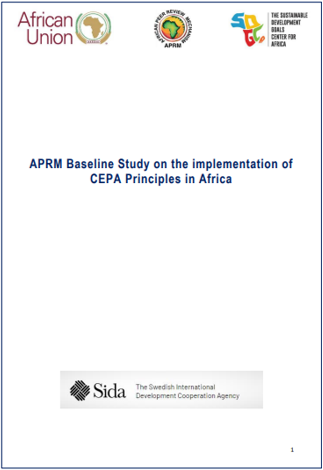The 11 principles of effective governance for sustainable development are linked to 62 commonly used strategies for operationalizing responsive and effective governance. Many of these strategies have been recognized and endorsed over the years in various UN forums, resolutions and treaties. Below country studies review the application of the principles and related strategies on the ground.
APRM Baseline Study on the implementation of CEPA Principles in Africa
Countries: Botswana, Egypt, Ghana, Kenya, Lesotho, Mauritius, Nigeria, Rwanda, Senegal, South Africa, Sudan, Tunisia, and Uganda.
As an outcome of a regional workshop on effective governance for sustainable development, which was held from 30 October to 1 November 2019 in Pretoria, South Africa, the African Peer Review Mechanism (APRM) and UN DESA resolved to undertake a baseline study on the status of implementation of the eleven principles of effective governance in Africa. Countries were selected to answer an e-questionnaire based on different criteria, including geographical balance, progress on SDGs and Agenda 2063, engagement in APRM governance assessment reviews and the country's responsiveness to submit voluntary national reviews (VNRs).
Status of implementation of the principles of effective governance for sustainable development in Kenya
This conference room paper was prepared for the Committee's 20th session (2021) by former Committee member Ms. Margaret Kobia. The main focus of the paper is a synthesis of Kenya’s governance framework and architecture and their convergence with the 11 CEPA principles of effective governance with a view to documenting status of implementation. The paper concludes that Kenya, especially after the promulgation of the 2010 Constitution, has always strived to advance the CEPA principles in many forms. The CEPA framework thus provides a more explicit approach to the identification of more effective strategies for implementation.
Implementation of principles of effective public administration in the countries of Eastern Europe and Central Asia
Countries: Armenia, Azerbaijan, Belarus, Georgia, Kazakhstan, Kyrgyzstan, Moldova, Russian Federation, Tajikistan, Uzbekistan, Ukraine
A group of experts on Eastern European and Central Asian countries, guided by the Moscow State Institute of International Relations (MGIMO), prepared a report on the implementation of the principles of effective governance in countries of Eastern Europe and Central Asia, examining the state of public administration and highlighting key governance problems remaining to be solved.
 Welcome to the United Nations
Welcome to the United Nations



